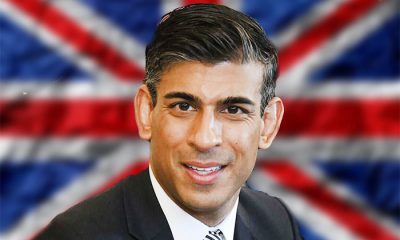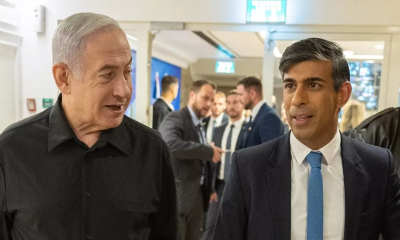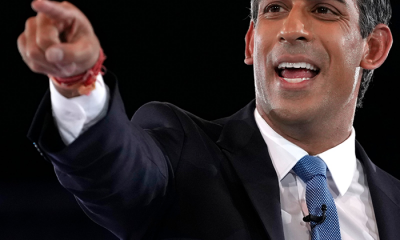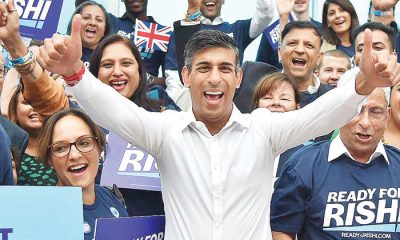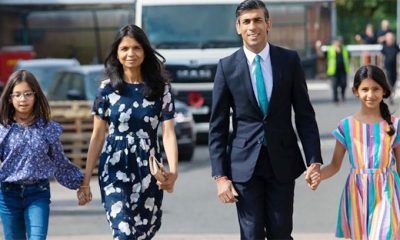Midweek Review
‘Will UK’s new PM deliver justice for Tamils?’
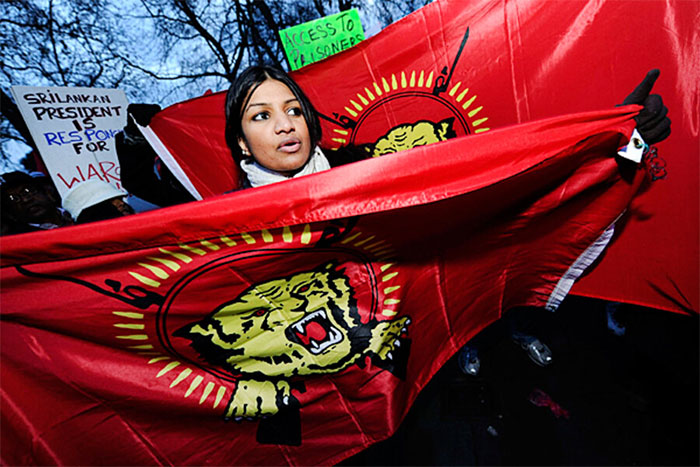
Tamil Guardian asks:
The UK policy, regarding mainly Sri Lankan Tamils held in Diego Garcia, is likely to remain unchanged. Some of those who reached Diego Garcia, home for the strategic US military base, over a year ago, have already been sent back “voluntarily” to Sri Lanka. They returned in the wake of the UK warning that they would be settled in a third country, like Rwanda in Africa, unless they voluntarily agreed to go back. Elevation of Rishi Sunak, to the premiership, may not influence the controversial British policy as regards Diego Garcia (Chagos Islands) either. The UK, a member of the Geneva-based United Nations Human Rights Council, has blatantly ignored a ruling of the International Court of Justice at the Hague, on February 25, 2019, to hand over Chagos Islands to its rightful owner, Mauritius
By Shamindra Ferdinando
New UK Prime Minister Rishi Sunak’s father, Yashvir Sunak, and mother, Usha Sunak, are Africans of Indian origin who migrated to the UK in the 60s. Rishi was born in Southampton, Hampshire, on May 12, 1980.
Sunak succeeded Liz Truss after having lost his first bid to secure the leadership, in September this year.
The appointment of Sunak, a Hindu of Panjabi lineage, as the UK’s Premier, at a time of a severe economic crisis, has attracted international media attention, particularly that of India. However, the fact that Rishi’s parents were east Africans, Kenya (Yashvir) and Tanzania (Usha) seemed to have been largely ignored, with a section of the Indian media claiming him as their own.
Sunak’s appointment, that was made amidst Diwali, the Hindu festival of lights, prompted India’s largest Hindi-language newspaper, Dainik Bhaskar to go jingoistic. “Another Diwali gift to the country. The Indian origin Rishi to rule the whites.”
“Indian son rises over the empire. History comes full circle in Britain,” an NDTV telecast declared. “From Age of Empire to Rishi Raj as Sunak moves into No 10,” boasted The Times of India.
The BBC, in a report headlined ‘Rishi Sunak: A quick guide to the UK’s new Prime Minister,’ pointed out that the Conservative Party MP, for just seven years, had secured a US green card that granted him the right to live there while he served as the UK’s Finance Minister aka Chancellor, in February, 2020. In spite of entering government, Sunak remained a green card holder, though he was obliged to make the U.S. their permanent home.
Rishi Sunak had to defend his wife, Akshata Murthy, daughter of Indian billionaire, Narayana Murthy ,in the wake of shocking disclosure that she didn’t pay UK taxes on massive earnings overseas, though not illegal. Later, the lady agreed to pay British taxes. The issue at hand should be examined against the backdrop of the UK media assertions that the couple’s wealth amounted to as much as 730 mn Sterling Pounds. Against the backdrop of Sunak’s recent vow (a couple of months before his elevation to the top position), to pursue Sri Lanka on accountability issues, should be of grave concern to this country, though it could be mere election rhetoric. It would be pertinent to examine Sri Lanka’s triumph over the Liberation Tigers of Tamil Eelam (LTTE), in May 2009, the origins of terrorism here and post-war accountability issues.
Pro-Eelamists seem quite serious about holding the UK Premier to his promise. The Tamil Guardian, in a report titled ‘Rishi Sunak – Will Britain’s new Prime Minister deliver justice for Tamils?’ dated October 24, 2022, quoted the Conservative politician as having assured an online audience of Tamil Conservatives in August that he backs their struggle.
This assurance was given in the run-up to the 51st session of the Geneva-based United Nations Human Rights Council (UNHRC) where the UK, in its capacity as the leader of the Sri Lanka Core Group, voted for the resolution against Sri Lanka.
Sunak declared in August: “My heart goes out to all of you and all of those in Sri Lanka.” The politician went on to emphasize his vision for what he called a democratic country free from corruption and inappropriate military influence. To achieve this and overcome the crippling economic disaster, Sunak asserted the need for conditional assistance through the International Monetary Fund (IMF).
The then Finance Minister commented on the ‘hurt and pain caused by the civil war and the events of 2009,’ while throwing his weight behind Tamils in their struggle for “justice and accountability for mass atrocities” claimed to have been committed during the final stages of the armed conflict. Sunak reiterated his support for Western powers taking a tougher stance on Sri Lanka.
“I am proud of the UK’s role, and the UK will continue to play a central role in bringing about justice and accountability,” The Tamil Guardian quoted Sunak as having said.
Sunak stressed his support for the latest UN resolution on Sri Lanka, which mandated the collection of evidence that may be used in a future war crimes tribunal.
Asked how Britain would ensure that Sri Lanka officials would not spend their “ill-gotten gains in the UK”, Sunak responded by stating that any future government, under him, would look at “how we’ve done this to Russian officials.” The Minister was referring to harsh sanctions ever against Russia in the wake of the war in Ukraine. “I helped put this together” Sunak boasted. “We’ve got a much better playbook and we know more about how to do it… It is a new tool in our toolkit.”
Commenting on the continuing demand to accept the Tamil genocide, Sunak stated that he would look into the matter and that different countries would have different standards but that for the UK this would be a legal matter, following a court proceeding.
Of course, no one among the audience raised India’s accountability in spite of thousands of deaths and disappearances in Sri Lanka’s Northern and Eastern regions, during the deployment of the Indian Army (July 1987-March 1990). India lost nearly 1,300 officers and men and double that figure wounded. The LTTE retaliated by assassinating wartime Indian Premier Rajiv Gandhi, at Sriperumbudur, in May 1991. The new UK Premier cannot be unaware that at the time the LTTE assassinated Gandhi, the group maintained its International Secretariat in London. The UK turned a blind eye to the LTTE issuing statements from London about its terror attacks. Those statements primarily dealt with attacks in Sri Lanka.
Anton Balasingham, former employee at the British High Commission, Colombo, was among those who received British citizenship in spite of being members of the dreaded terrorist organization. At that time (Balasingham died in December 2006, in the UK,) he served as the LTTE’s theoretician. The late Balasingham’s wife, Adele, who adorned female LTTE cadres’ necks with cyanide capsules, still lives in the UK. Perhaps, the suicide bomber, who targeted Rajiv Gandhi at an election rally, received her cyanide capsule, too, from Adele. Tamil conservatives wouldn’t dare discuss that wretched past.
A hostile agenda

British PM Rishi Sunak
Sri Lanka brought the war to a successful conclusion, seven years before Sunak entered Parliament, in 2015, the year the then yahapalana government co-sponsored the Geneva resolution against one’s own country, in Geneva.
Three years later, the UK succeeded the US as leader of Sri Lanka Core Group after the latter quit the Geneva Council alleging it was a cesspool of political bias for exposing crimes committed by Israel in occupied/illegally annexed Palestinian lands. (Don’t forget how Israeel ‘killed’ the Goldstone report on 2008 war crimes report).
The new Conservative party leader owed an explanation how the UK compared the ongoing war in Ukraine and eradication of Tamil terrorism in Sri Lanka. Obviously, the two situations cannot be compared, under any circumstances though Sunak felt comfortable in playing politics, with the issue at hand, for his benefit.
With Sunak moving to No 10, the ongoing war crimes allegations campaign against Sri Lanka is likely to be intensified. Over the past several years, the issue has been raised in the House of Commons, on many occasions, with some MPs targeting General Shavendra Silva, Chief of Defence Staff (CDS).
Labour MP Virendra Sharma, of Indian origin, is one of those lawmakers seeking political benefit at Sri Lanka’s expense. Sharma has asked the Secretary of State for Foreign, Commonwealth and Development Affairs, the status of discussions with the US Administration, regarding the designation of Gen. Shavendra Silva, under the Global Human Rights (GHR) Sanctions regime. The US designated the CDS, in February, 2020, as a persona non grata.
Both President Ranil Wickremesinghe and Prime Minister Dinesh Gunawardena congratulated the new British leader. They expressed confidence bilateral ties could be further strengthened. However, the incumbent leadership should take tangible measures to set the record straight. Fourteen years after Sri Lanka eradicated Tamil terrorism that at one point threatened to destabilize the region (Sunak was nine when Indian-trained Sri Lankan Tamil terrorists launched a sea borne raid on the Maldives. They nearly succeeded in assassinating the then Maldivian President Maumoon Abdul Gayoom. India intervened to save Gayoom. A vessel that had been commandeered by Sri Lankan terrorists, fleeing the aborted coup attempt in the Maldives, was sunk in international waters, by the Indian Navy. Those who demand accountability on the part of Sri Lanka are never bothered about the deaths caused by such confrontations.
As a person of Indian origin, though his parents were from East Africa, Sunak should be able to comprehend the daunting challenge countries face in defeating terrorism that received the backing of powerful international players, when it is in the interest of their global agenda. The LTTE couldn’t have waged nearly a 30-year war unless it had the wherewithal to raise funds in Europe, the US, Canada, Australia and many other countries, over the years. The LTTE had unlimited funds to procure weapons, ranging from Chinese artillery to shoulder fired anti-aircraft missiles. In spite of the group being proscribed in the US, the UK and India, its operatives continuously collected money required to procure weapons and transferred them to Sri Lanka. Thanks to specific intelligence, provided by the US, in the latter stages, intrepid SLN units hunted down the LTTE’s floating arsenals, on the high seas. The war couldn’t have been brought to a successful conclusion, in May, 2009, if Vice Admiral Wasantha Karannagoda’s Navy failed in its task.
The UK never interfered with the LTTE operations on its soil. In fact, successive governments there ensured law enforcement authorities refrained from taking action as they didn’t dare to upset voters of Sri Lankan Tamil origin. The UK granted special status to the LTTE, during the war. The LTTE continued to enjoy privileged status, even after the assassination of highly popular Sri Lankan Foreign Minister Lakshman Kadirgamar, during the Ceasefire Agreement worked out by the Norwegians. Anton Balasingham, who definitely knew of the planned assassinations of Rajiv Gandhi, in May 1991, moderate lawmaker Dr. Neelan Thiruchelvam, in July 1999, and Kadirgamar, in August 2005, was allowed to continue his ‘work’ in the UK without hindrance. As the LTTE’s top Europe-based emissary, Balasingham, a British passport holder, received foreign delegates and other LTTE operatives.
Close on the heels of Kadirgamar’s assassination, Balasingham received the then Norwegian Foreign Minister Jan Petersen and Deputy Foreign Minister Vidar Helgessen, in London on August 17, 2005.
How UK tried to suppress wartime cables
The UK strenuously tried to thwart the disclosure of diplomatic cables, that originated from the British High Commission in Colombo. The Foreign and Commonwealth Office (FCO) desperately tried to block the revelations as the UK realized the whole operation, meant to haul the Sri Lankan military before foreign judges, could go awry.
Lord Naseby, in terms of the Freedom of Information Act (FOIA), made his request to the FCO, on November 6, 2014, nearly a year before the yahapalana government betrayed the military, at the UNHRC, by co-sponsoring an accountability resolution, seven years after the successful conclusion of the war.
The FCO, on December 3, 2014, informed Lord Naseby that it had the required information though it needed time to consider his request. Clearly, Naseby’s request rattled the FCO. On January 5, 2015, the FCO told Lord Naseby that his request couldn’t be granted. Lord Naseby, on January 14, 2015, requested for an internal review of the FCO’s decision.
The FCO informed Lord Naseby, on February 19, 2015, that the decision couldn’t be changed. An irate Lord Naseby complained to the FCO, on March 16, 2015. The FCO, on May 7, 2015, reiterated its original decision to deprive Lord Naseby of the requested information.
Interestingly, the FCO, on December 21, 2015, offered to provide a section of the previously withheld documents, claiming that the move was made possible due to the releasing of Office of the United Nations High Commissioner for Human Rights (OHCHR) report on the investigation, on Sri Lanka, on September 15, 2015.
However, the FCO withheld a substantial section of the requested documents, on the basis of Sections 27 (1) (a), 31 and 41 of FOIA.
Having received a part of the requested documents, Lord Naseby had raised concerns with the Information Commissioner’s Office that the FCO could be still holding documents that could be released. Subsequently, the FCO released three more censored documents, on February 23, 2016. The three documents were dated April 7, 25 and 26, 2009.
The FCO wouldn’t have released any documents if not for Lord Naseby seeking the intervention of the Information Commissioner’s Office. Lord Naseby got in touch with the Information Commissioner’s Office, on June 10, 2015, five months after the presidential election here that brought an end to the unbroken Mahinda Rajapaksa rule, from 2005 to 2015. Following Rajapaksa’s defeat, President Maithripala Sirisena, as agreed in the run up to the presidential poll, invited UNP leader Ranil Wickremesinghe to form a new government. Violating all parliamentary norms, Wickremesinghe was sworn in as the Prime Minister, in spite of having the backing of less than 50 members in the 225-member Parliament. The SLFP-led UPFA, in spite of having a staggering two-thirds majority in the House, with the SLFP group alone comprising 126 members, gave into the Sirisena-Wickremesinghe move. The Geneva betrayal should be examined against that political background.
The new UK Premier must be reminded that Northern Tamils, at the 2010 presidential election, voted overwhelmingly for the then General Sarath Fonseka though he lost the election by over 1.8 mn votes, though they had previously accused him and his Army of committing war crimes. The war-winning Army Chief fielded by a coalition of political parties, including the dominant Tamil party, the Tamil National Alliance (TNA), secured all eight predominately Tamil speaking electoral districts in the Northern and Eastern provinces less than a year after the LTTE’s defeat. The TNA’s backing for Fonseka should be examined taking into consideration its 2001 declaration that the LTTE was the sole representative of the Tamil speaking people and the role played by the US in forming that grouping.
Midweek Review
Fonseka clears Rajapaksas of committing war crimes he himself once accused them of
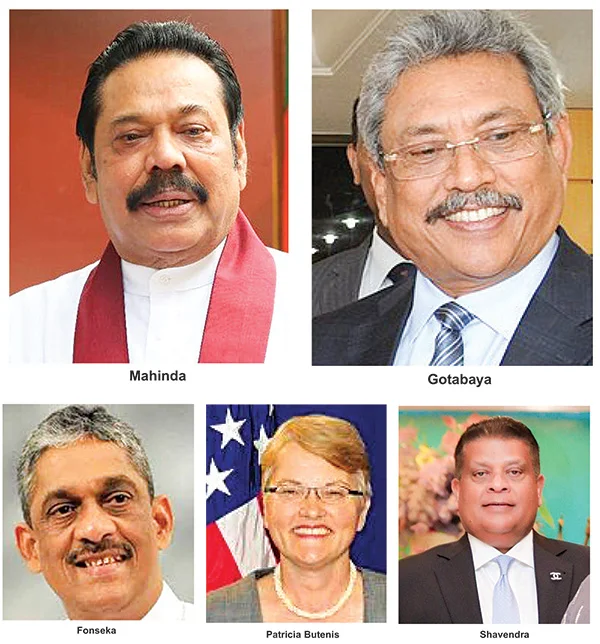
With Sri Lanka’s 17th annual war victory over separatist Tamil terrorism just months away, warwinning Army Chief, Field Marshal Sarath Fonseka (Dec. 06, 2005, to July 15, 2009) has significantly changed his war narrative pertaining to the final phase of the offensive that was brought to an end on May 18, 2009.
The armed forces declared the conclusion of ground operations on that day after the entire northern region was brought back under their control. LTTE leader Velupillai Prabhakaran, hiding within the secured area, was killed on the following day. His body was recovered from the banks of the Nanthikadal lagoon.
With the war a foregone conclusion, with nothing to save the increasingly hedged in Tigers taking refuge among hapless Tamil civilians, Fonseka left for Beijing on May 11, and returned to Colombo, around midnight, on May 17, 2009. The LTTE, in its last desperate bid to facilitate Prabhakatan’s escape, breached one flank of the 53 Division, around 2.30 am, on May 18. But they failed to bring the assault to a successful conclusion and by noon the following day those fanatical followers of Tiger Supremo, who had been trapped within the territory, under military control, died in confrontations.
During Fonseka’s absence, the celebrated 58 Division (formerly Task Force 1), commanded by the then Maj. Gen. Shavendra Silva, advanced 31/2 to 4 kms and was appropriately positioned with Maj. Gen. Kamal Gunaratne’s 53 Division. The LTTE never had an opportunity to save its leader by breaching several lines held by frontline troops on the Vanni east front. There couldn’t have been any other option than surrendering to the Army.
The Sinha Regiment veteran, who had repeatedly accused the Rajapaksas of war crimes, and betraying the war effort by providing USD 2 mn, ahead of the 2005 presidential election, to the LTTE, in return for ordering the polls boycott that enabled Mahinda Rajapaksa’s victory, last week made noteworthy changes to his much disputed narrative.
GR’s call to Shavendra What did the former Army Commander say?
* The Rajapaksas wanted to sabotage the war effort, beginning January 2008.
* In January 2008, Mahinda Rajapaksa, Defence Secretary Gotabaya Rajapaksa and Navy Commander VA Wasantha Karannagoda, proposed to the National Security Council that the Army should advance from Vavuniya to Mullithivu, on a straight line, to rapidly bring the war to a successful conclusion. They asserted that Fonseka’s strategy (fighting the enemy on multiple fronts) caused a lot of casualties.
* They tried to discourage the then Lt. Gen. Fonseka
* Fonseka produced purported video evidence to prove decisive intervention made by Defence Secretary Gotabaya Rajapaksa on the afternoon of May 17. The ex-Army Chief’s assertion was based on a telephone call received by Maj. Gen. Shavendra Silva from Gotabaya Rajapaksa. That conversation had been captured on video by Swarnavahini’s Shanaka de Silva who now resides in the US. He had been one of the few persons, from the media, authorised by the Army Headquarters and the Defence Ministry to be with the Army leadership on the battlefield. Fonseka claimed that the videographer fled the country to escape death in the hands of the Rajapaksas. It was somewhat reminiscent of Maithripala Sirisena’s claim that if Rajapaksas win the 2015 Presidential election against him he would be killed by them.
* Shanaka captured Shavendra Silva disclosing three conditions laid down by the LTTE to surrender namely (a) Their casualties should be evacuated to Colombo by road (b) They were ready to exchange six captured Army personnel with those in military custody and (c) and the rest were ready to surrender.
* Then Fonseka received a call from Gotabaya Rajapaksa, on a CDMA phone. The Defence Secretary issued specific instructions to the effect that if the LTTE was to surrender that should be to the military and definitely not to the ICRC or any other third party. Gotabaya Rajapaksa, one-time Commanding Officer of the 1st battalion of the Gajaba Regiment, ordered that irrespective of any new developments and talks with the international community, offensive action shouldn’t be halted. That declaration directly contradicted Fonseka’s claim that the Rajapaksas conspired to throw a lifeline to the LTTE.
Fonseka declared that the Rajapaksa brothers, in consultation with the ICRC, and Amnesty International, offered an opportunity for the LTTE leadership to surrender, whereas his order was to annihilate the LTTE. The overall plan was to eliminate all, Fonseka declared, alleging that the Rajapaksa initiated talks with the LTTE and other parties to save those who had been trapped by ground forces in a 400 m x 400 m area by the night of May 16, among a Tamil civilian human shield held by force.
If the LTTE had agreed to surrender to the Army, Mahinda Rajapaksa would have saved their lives. If that happened Velupillai Prabhakaran would have ended up as the Chief Minister of the Northern Province, he said. Fonseka shocked everyone when he declared that he never accused the 58 Division of executing prisoners of war (white flag killings) but the issue was created by those media people embedded with the military leadership. Fonseka declared that accusations regarding white flag killings never happened. That story, according to Fonseka, had been developed on the basis of the Rajapaksas’ failed bid to save the lives of the LTTE leaders.
Before we discuss the issues at hand, and various assertions, claims and allegations made by Fonseka, it would be pertinent to remind readers of wartime US Defence Advisor in Colombo Lt. Col. Lawrence Smith’s June 2011 denial of white flag killings. The US State Department promptly declared that the officer hadn’t spoken at the inaugural Colombo seminar on behalf of the US. Smith’s declaration, made two years after the end of the war, and within months after the release of the Darusman report, dealt a massive blow to false war crimes allegations.
UN Secretary-General Ban Ki-moon, in 2010, appointed a three-member Panel of Experts, more like a kangaroo court, consisting of Marzuki Darusman, Yasmin Sooka, and Steven Ratner, to investigate war crimes accusations.
Now Fonseka has confirmed what Smith revealed at the defence seminar in response to a query posed by Maj. General (retd.) Ashok Metha of the IPKF to Shavendra Silva, who had been No 02 in our UN mission, in New York, at that time.
White flag allegations
‘White flag’ allegations cannot be discussed in isolation. Fonseka made that claim as the common presidential candidate backed by the UNP-JVP-TNA combine. The shocking declaration was made in an interview with The Sunday Leader Editor Frederica Jansz published on Dec. 13, 2009 under ‘Gota ordered them to be shot – General Sarath Fonseka.’
The ‘white flag’ story had been sensationally figured in a leaked confidential US Embassy cable, during Patricia Butenis tenure as the US Ambassador here. Butenis had authored that cable at 1.50 pm on Dec. 13, 2009, the day after the now defunct The Sunday Leader exclusive. Butenis had lunch with Fonseka in the company of the then UNP Deputy Leader Karu Jayasuriya, according to the cable. But for the writer the most interesting part had been Butenis declaration that Fonseka’s advisors, namely the late Mangala Samaraweera, Anura Kumara Dissanayake (incumbent President) and Vijitha Herath (current Foreign Minister) wanted him to retract part of the story attributed to him.
Frederica Jansz fiercely stood by her explosive story. She reiterated the accuracy of the story, published on Dec. 13, 2009, during the ‘white flag’ hearing when the writer spoke to her. There is absolutely no reason to suspect Frederica Jansz misinterpreted Fonseka’s response to her queries.
Subsequently, Fonseka repeated the ‘white flag’ allegation at a public rally held in support of his candidature. Many an eyebrow was raised at The Sunday Leader’s almost blind support for Fonseka, against the backdrop of persistent allegations directed at the Army over Lasantha Wickrematunga’s killing. Wickrematunga, an Attorney-at-Law by profession and one-time Private Secretary to Opposition Leader Sirimavo Bandaranaike, was killed on the Attidiya Road, Ratmalana in early January 2009.
The Darusman report, too, dealt withthe ‘white flag’ killings and were central to unsubstantiated Western accusations directed at the Sri Lankan military. Regardless of the political environment in which the ‘white flag’ accusations were made, the issue received global attention for obvious reasons. The accuser had been the war-winning Army Commander who defeated the LTTE at its own game. But, Fonseka insisted, during his meeting with Butenis, as well as the recent public statement that the Rajapaksas had worked behind his back with some members of the international community.
Fresh inquiry needed
Fonseka’s latest declaration that the Rajapaksas wanted to save the LTTE leadership came close on the heels of Deputy British Prime Minister David Lammy’s whistle-stop visit here. The UK, as the leader of the Core Group on Sri Lanka at the Geneva-based United Nations Human Rights Council, spearheads the campaign targeting Sri Lanka.
Lammy was on his way to New Delhi for the AI Impact Summit. The Labour campaigner pushed for action against Sri Lanka during the last UK general election. In fact, taking punitive action against the Sri Lankan military had been a key campaign slogan meant to attract Tamil voters of Sri Lankan origin. His campaign contributed to the declaration of sanctions in March 2025 against Admiral of the Fleet Wasantha Karannagoda, General (retd) Shavendra Silva, General (retd) Jagath Jayasuriya and ex-LTTE commander Karuna, who rebelled against Prabhakaran. Defending Shavendra Silva, Fonseka, about a week after the imposition of the UK sanctions, declared that the British action was unfair.
But Fonseka’s declaration last week had cleared the Rajapaksas of war crimes. Instead, they had been portrayed as traitors. That declaration may undermine the continuous post-war propaganda campaign meant to demonise the Rajapaksas and top ground commanders.
Canada, then a part of the Western clique that blindly towed the US line, declared Sri Lanka perpetrated genocide and also sanctioned ex-Presidents Mahinda Rajapaksa and Gotabaya Rajapaksa. Other countries resorted to action, though such measures weren’t formally announced. General (retd) Jagath Dias and Maj. Gen (retd) Chagie Gallage were two of those targeted.
Against the backdrop of Fonseka’s latest claims, in respect of accountability issues, the urgent need to review action taken against Sri Lanka cannot be delayed. Although the US denied visa when Fonseka was to accompany President Maithripala Sirisena to the UN, in Sept. 2016, he hadn’t been formally accused of war crimes by the western powers, obviously because he served their interests.
On the basis of unsubstantiated allegations that hadn’t been subjected to judicial proceedings, Geneva initiated actions. The US, Canada and UK acted on those accusations. The US sanctioned General Shavendra Silva in Feb. 2020 and Admiral Karannagoda in April 2023.
What compelled Fonseka to change his narrative, 18 years after his Army ended the war? Did Fonseka base his latest version solely on Shanaka de Silva video? Fonseka is on record as claiming that he got that video, via a third party, thereby Shanaka de Silva had nothing to do with his actions.
DNA and formation of DP
Having realised that he couldn’t, under any circumstances, reach a consensus with the UNP to pursue a political career with that party, Fonseka teamed up with the JVP, one of the parties in the coalition that backed his presidential bid in 2010. Fonseka’s current efforts to reach an understanding with the JVP/NPP (President Anura Kumara Dissanayake is the leader of both registered political parties) should be examined against the backdrop of their 2010 alliance.
Under Fonseka’s leadership, the JVP, and a couple of other parties/groups, contested, under the symbol of the Democratic National Alliance (DNA) that had been formed on 22 Nov. 2009. but the grouping pathetically failed to live up to their own expectations. The results of the parliamentary polls, conducted in April 2010, had been devastating and utterly demoralising. Fonseka, who polled about 40% of the national vote at the January 2010 presidential election, ended up with just over 5% of the vote, and the DNA only managed to secure seven seats, including two on the National List. The DNA group consisted of Fonseka, ex-national cricket captain Arjuna Ranatunga, businessman Tiran Alles and four JVPers. Anura Kumara Dissanayake was among the four.
Having been arrested on February 8, 2010, soon after the presidential election, Fonseka was in prison. He was court-martialed for committing “military offences”. He was convicted of corrupt military supply deals and sentenced to three years in prison. Fonseka vacated his seat on 7 Oct .2010. Following a failed legal battle to protect his MP status, Fonseka was replaced by DNA member Jayantha Ketagoda on 8 March 2011. But President Mahinda Rajapaksa released Fonseka in May 2012 following heavy US pressure. The US went to the extent of issuing a warning to the then SLFP General Secretary Maithripala Sirisena that unless President Rajapaksa freed Fonseka he would have to face the consequences (The then Health Minister Sirisena disclosed the US intervention when the writer met him at the Jealth Ministry, as advised by President Rajapaksa)
By then, Fonseka and the JVP had drifted apart and both parties were irrelevant. Somawansa Amarasinghe had been the leader at the time the party decided to join the UNP-led alliance that included the TNA, and the SLMC. The controversial 2010 project had the backing of the US as disclosed by leaked secret diplomatic cables during Patricia Butenis tenure as the US Ambassador here.
In spite of arranging the JVP-led coalition to bring an end to the Rajapaksa rule, Butenis, in a cable dated 15 January 2010, explained the crisis situation here. Butenis said: “There are no examples we know of a regime undertaking wholesale investigations of its own troops or senior officials for war crimes while that regime or government remained in power. In Sri Lanka this is further complicated by the fact that responsibility for many of the alleged crimes rests with the country’s senior civilian and military leadership, including President Rajapaksa and his brothers and opposition candidate General Fonseka.”
Then Fonseka scored a major victory when Election Commissioner Mahinda Deshapriya on 1 April, 2013, recognised his Democratic Party (DNA was registered as DP) with ‘burning flame’ as its symbol. There hadn’t been a previous instance of any service commander registering a political party. While Fonseka received the leadership, ex-Army officer Senaka de Silva, husband of Diana Gamage ((later SJB MP who lost her National List seat over citizenship issue) functioned as the Deputy Leader.
Having covered Fonseka’s political journey, beginning with the day he handed over command to Lt. Gen. Jagath Jayasuriya, in July, 2009, at the old Army Headquarters that was later demolished to pave the way for the Shangri-La hotel complex, the writer covered the hastily arranged media briefing at the Solis reception hall, Pitakotte, on 2 April, 2023. Claiming that his DP was the only alternative to what he called corrupt Mahinda Rajapaksa’s government and bankrupt Ranil Wickremesinghe-led Opposition, a jubilant Fonseka declared himself as the only alternative (‘I am the only alternative,’ with strapline ‘SF alleges Opposition is as bad as govt’. The Island, April 3, 2013).
Fonseka had been overconfident to such an extent, he appealed to members of the government parliamentary group, as well as the Opposition (UNP), to switch allegiance to him. As usual Fonseka was cocky and never realised that 40% of the national vote he received, at the presidential election, belonged to the UNP, TNA and the JVP. Fonseka also disregarded the fact that he no longer had the JVP’s support. He was on his own. The DP never bothered to examine the devastating impact his 2010 relationship with the TNA had on the party. The 2015 general election results devastated Fonseka and underscored that there was absolutely no opportunity for a new party. The result also proved that his role in Sri Lanka’s triumph over the LTTE hadn’t been a decisive factor.
RW comes to SF’s rescue
Fonseka’s DP suffered a humiliating defeat at the August 2015 parliamentary polls. The outcome had been so bad that the DP was left without at least a National List slot. Fonseka was back to square one. If not for UNP leader and Prime Minister Ranil Wickremesinghe, Fonseka could have been left in the cold. Wickremesinghe accommodated Fonseka on their National List, in place of SLFPer M.K.D.S. Gunawardene, who played a critical role in an influential section of the party and the electorate shifting support to Maithripala Sirisena. Gunawardena passed away on 19 January, 2016. Wickremesinghe and Fonseka signed an agreement at Temple Trees on 3 February, 2016. Fonseka received appointment as National List MP on 9 February, 2016, and served as Minister of Regional Development and, thereafter, as Minister of Wildlife and Sustainable Development, till Oct. 2018. Fonseka lost his Ministry when President Sirisena treacherously sacked Wickremesinghe’s government to pave the way for a new partnership with the Rajapaksas. The Supreme Court discarded that arrangement and brought back the Yahapalana administration but Sirisena, who appointed Fonseka to the lifetime rank of Field Marshal, in recognition of his contribution to the defeat of terrorism, refused to accommodate him in Wickremesinghe’s Cabinet. The President also left out Wasantha Karannagoda and Roshan Goonetilleke. Sirisena appointed them Admiral of the Fleet and Marshal of Air Force, respectively, on 19, Sept. 2019, in the wake of him failing to secure the required backing to contest the Nov. 2019 presidential election.
Wickremesinghe’s UNP repeatedly appealed on behalf of Fonseka in vain to Sirisena. At the 2020 general election, Fonseka switched his allegiance to Sajith Premadasa and contested under the SJB’s ‘telephone’ symbol and was elected from the Gampaha district. Later, following a damaging row with Sajith Premadasa, he quit the SJB as its Chairman and, at the last presidential election, joined the fray as an independent candidate. Having secured just 22,407 votes, Fonseka was placed in distant 9th position. Obviously, Fonseka never received any benefits from support extended to the 2022 Aragalaya and his defeat at the last presidential election seems to have placed him in an extremely difficult position, politically.
Let’s end this piece by reminding that Fonseka gave up the party leadership in early 2024 ahead of the presidential election. Senaka de Silva succeeded Fonseka as DP leader, whereas Dr. Asosha Fernando received appointment as its Chairman. The DP has aligned itself with the NPP. The rest is history.
By Shamindra Ferdinando
Midweek Review
Strengths and weaknesses of BRICS+: Implications for Global South

The 16th BRICS Summit, from 22 to 24 October 2024 in Kazan, was attended by 24 heads of state, including the five countries that officially became part of the group on 1 January: Saudi Arabia, the United Arab Emirates, Iran, Egypt and Ethiopia. Argentina finally withdrew from the forum after Javier Milei’s government took office in 2023.
In the end, it changed its strategy and instead of granting full membership made them associated countries adding a large group of 13 countries: two from Latin America (Bolivia and Cuba), three from Africa (Algeria, Nigeria, Uganda) and eight from Asia (Belarus, Indonesia, Kazakhstan, Malaysia, Thailand, Turkey, Uzbekistan and Vietnam). This confirms the expansionary intent of the BRICS, initiated last year and driven above all by China, which seeks to turn the group into a relevant multilateral forum, with focus on political than economic interaction, designed to serve its interests in the geopolitical dispute with the United States. This dispute however is not the making of China but has arisen mainly due to the callous bungling of Donald Trump in his second term in office.
China has emerged as the power that could influence the membership within the larger group more than its rival in the region, India. Obviously, the latter is concerned about these developments but seems powerless to stop the trend as more countries realize the need for the development of capacity to resist Western dominance. India in this regard seems to be reluctant possibly due to its defence obligations to the US with Trump declaring war against countries that try to forge partnerships aiming to de-dollarize the global economic system.
The real weakness in BRICS therefore, is the seemingly intractable rivalry between China and India and the impact of this relationship on the other members who are keen to see the organisation grow its capacity to meet its stated goals. China is committed to developing an alternative to the Western dominated world order, particularly the weaponization of the dollar by the US. India does not want to be seen as anti-west and as a result India is often viewed as a reluctant or cautious member of BRICS. This problem seems to be perpetuated due to the ongoing border tensions with China. India therefore has a desire to maintain a level playing field within the group, rather than allowing it to be dominated by Beijing.
Though India seems to be committed to a multipolar world, it prefers focusing on economic cooperation over geopolitical alignment. India thinks the expansion of BRICS initiated by China may dilute its influence within the bloc to the advantage of China. India fears the bloc is shifting toward an anti-Western tilt driven by China and Russia, complicating its own strong ties with the West. India is wary of the new members who are also beneficiaries of China’s Belt and Road Initiative. While China aims to use BRICS for anti-Western geopolitical agendas, India favors focusing on South-South financial cooperation and reforming international institutions. Yet India seems to be not in favour of creating a new currency to replace the dollar which could obviously strengthen the South-South financial transactions bypassing the dollar.
Moreover, India has explicitly opposed the expansion of the bloc to include certain nations, such as Pakistan, indicating a desire to control the group’s agenda, especially during its presidency.
In this equation an important factor is the role that Russia could play. The opinion expressed by the Russian foreign minister in this regard may be significant. Referring to the new admissions the Russian Foreign Minister Sergey Lavrov has said: “The weight, prominence and importance of the candidates and their international standing were the primary factors for us [BRICS members]. It is our shared view that we must recruit like-minded countries into our ranks that believe in a multipolar world order and the need for more democracy and justice in international relations. We need those who champion a bigger role for the Global South in global governance. The six countries whose accession was announced today fully meet these criteria.”
The admission of three major oil producing countries, Saudi Arabia, Iran and UAE is bound to have a significant impact on the future global economic system and consequently may have positive implications for the Global South. These countries would have the ability to decisively help in creating a new international trading system to replace the 5 centuries old system that the West created to transfer wealth from the South to the North. This is so because the petro-dollar is the pillar of the western banking system and is at the very core of the de-dollarizing process that the BRICS is aiming at. This cannot be done without taking on board Saudi Arabia, a staunch ally of the west. BRICS’ expansion, therefore, is its transformation into the most representative community in the world, whose members interact with each other bypassing Western pressure. Saudi Arabia and Iran are actively mending fences, driven by a 2023 China-brokered deal to restore diplomatic ties, reopen embassies, and de-escalate regional tensions. While this detente has brought high-level meetings and a decrease in direct hostility rapprochement is not complete yet and there is hope which also has implications, positive for the South and may not be so for the North.
Though the US may not like what is going on, Europe, which may not endorse all that the former does if one is to go by the speech delivered by the Canadian PM in Brazil recently, may not be displeased about the rapid growth of BRICS. The Guardian UK highlighted expert opinion that BRICS expansion is rather “a symbol of broad support from the global South for the recalibration of the world order.” A top official at the Konrad Adenauer Foundation, Caroline Kanter has told the daily, “It is obvious that we [Western countries] are no longer able to set our own conditions and standards. Proposals will be expected from us so that in the future we will be perceived as an attractive partner.” At the same time, the bottom line is that BRICS expansion is perceived in the West as a political victory for Russia and China which augurs well for the future of BRICS and the Global South.
Poor countries, relentlessly battered by the neo-liberal global economy, will greatly benefit if BRICS succeeds in forging a new world order and usher in an era of self-sufficiency and economic independence. There is no hope for them in the present system designed to exploit their natural resources and keep them in a perpetual state of dependency and increasing poverty. BRICS is bound to be further strengthened if more countries from the South join it. Poor countries must come together and with the help of BRICS work towards this goal.
by N. A. de S. Amaratunga
Midweek Review
Eventide Comes to Campus
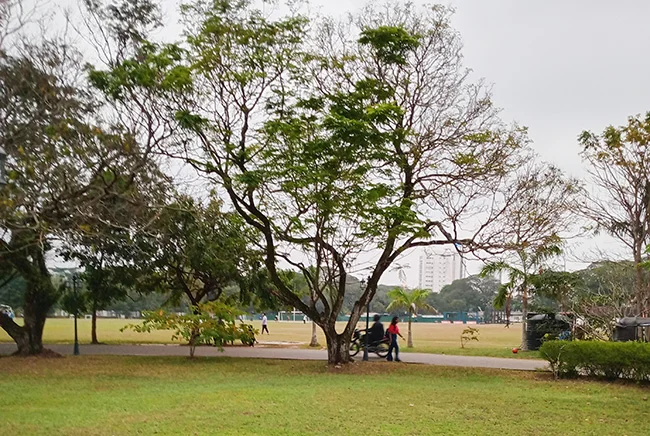
In the gentle red and gold of the setting sun,
The respected campus in Colombo’s heart,
Is a picture of joyful rest and relief,
Of games taking over from grueling studies,
Of undergrads heading home in joyful ease,
But in those bags they finally unpack at night,
Are big books waiting to be patiently read,
Notes needing completing and re-writing,
And dreamily worked out success plans,
Long awaiting a gutsy first push to take off.
By Lynn Ockersz
-

 Features5 days ago
Features5 days agoWhy does the state threaten Its people with yet another anti-terror law?
-

 Features5 days ago
Features5 days agoReconciliation, Mood of the Nation and the NPP Government
-

 Features5 days ago
Features5 days agoVictor Melder turns 90: Railwayman and bibliophile extraordinary
-

 Features4 days ago
Features4 days agoLOVEABLE BUT LETHAL: When four-legged stars remind us of a silent killer
-

 Features5 days ago
Features5 days agoVictor, the Friend of the Foreign Press
-

 Latest News6 days ago
Latest News6 days agoNew Zealand meet familiar opponents Pakistan at spin-friendly Premadasa
-

 Latest News6 days ago
Latest News6 days agoTariffs ruling is major blow to Trump’s second-term agenda
-

 Latest News6 days ago
Latest News6 days agoECB push back at Pakistan ‘shadow-ban’ reports ahead of Hundred auction


